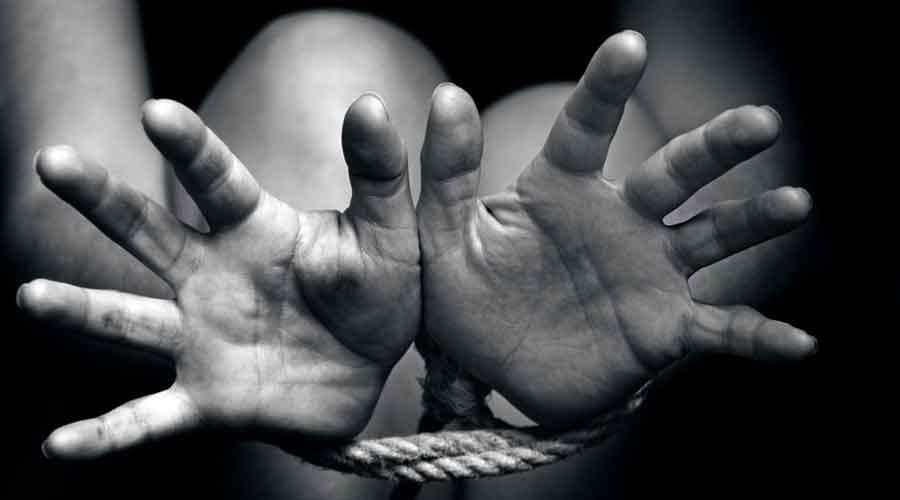The highlight of a panel discussion on human trafficking on Tuesday was personal accounts of some survivors.
The accounts suggested that their lives were an ongoing struggle, even after being rescued.
The traffickers first earn the victims’ trust and then exploit them. After the rescue, the road to justice is riddled with setbacks, where protectors often become perpetrators.
The Telegraph presents one such account, as shared by a survivor at the programme.
A girl was trafficked for the first time in 2017, when she was 14 years old.
Her mother had beaten her after a tiff. Miffed, the girl left home and reached a railway station in South 24-Parganas. She was crying there when a woman approached her.
“She consoled me and offered food. I refused since I did not know her. But she said she was like my elder sister,” the teenager told the audience on Tuesday.
The girl believed the woman. She was given jhalmuri and water that was spiked. She lost consciousness. When she came to, she was in a house in Meerut, Uttar Pradesh.
It was a brothel in the garb of a private apartment. She was allegedly forced into prostitution.
“I would get thrashed regularly for refusing to give in. I was treated like an animal, often forced to entertain up to 8-10 customers in a single day,” she said.
She spent six months there, before a customer took pity on her and called her mother and the cops. The call led to her rescue.
She came back home to her mother and stepfather. The latter blamed her for the entire ordeal. “I was verbally abused and one day, kicked out of the house,” she said.
The girl “desperately” wanted to get a job. She went begging for one, even a domestic help’s job, but in vain.
Another woman then found her and offered help. “She said she was a maid herself and would get me a similar job,” the girl said.
But the woman took her to a home and confined her. She sent a man inside who allegedly raped her multiple times. The man allegedly filmed the assault.
The girl realised she had been taken to another brothel. It was not “as organised” as the one in Meerut but every time she wanted to leave, she was blackmailed with the clip.
She was eventually rescued by the police.
But her ordeal was far from over. She was a minor both times she was trafficked.
A Protection of Children from Sexual Offences (Pocso) case was filed and a public prosecutor was appointed. The girl did not specify if the case pertained to the first or the second instance of trafficking.
The prosecutor allegedly sexually harassed her more than once.
“He would call me to his home to discuss case documents. When I said I would come with my mother, he insisted that I came alone,” the girl said.
When she protested his alleged advances and threatened to “expose” him, the lawyer is said to have told her: “You cannot do anything without solid evidence.”
By now, the survivor knew what evidence meant.
She filmed the next alleged sexual harassment attempt by the lawyer and went to the police.
But the lawyer was “very influential and had political connections”.
“I was told there was no point in pressing charges and it would be wise of me to negotiate with him in lieu of money. But I was adamant in registering the complaint.”
Her perseverance paid off. The complaint was filed and within 24 hours, the prosecutor was sacked from his job.
“The matter had reached the police superintendent and, through him, to higher authorities,” said a representative of World Vision India, the NGO that assisted the girl and organised Tuesday’s programme.
“The lawyer has been absconding. He has secured bail since the survivor had turned 18 during the alleged harassment and Pocso charges were not pressed. But his stature has been rightfully destroyed, thanks to the courage of this woman,” the representative said.
Asked what fuelled her to go ahead with the complaint, she said: “I wanted to ensure that man did not torment any other survivor like me.”
The audience, including veteran rights activists, government officials and the police, broke into applause.
